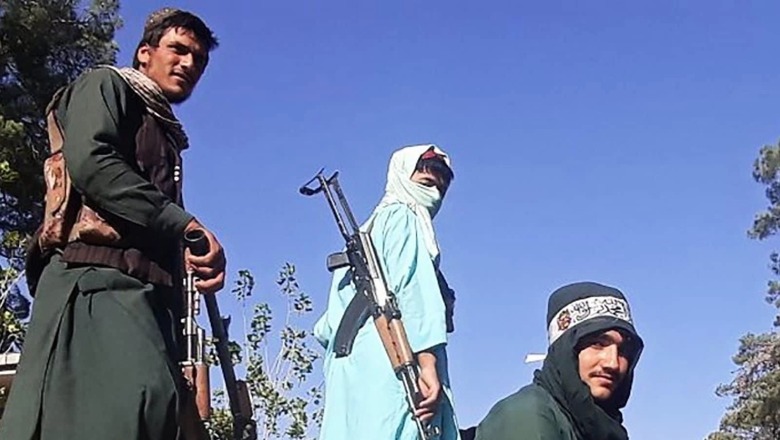
views
Even as international troops pull out of Afghanistan, the Taliban have managed to capture several key cities, now almost closing in on the national capital of Kabul. Several countries, including the United States and the United Kingdom, are in the process of evacuating citizens from the country which is now almost completely under Taliban control.
Many Indians are among the foreign nationals present in the country with three engineers being rescued on Thursday from an area that was not under the control of the Afghanistan government.
While the Taliban had been a threat and controlled several regions in the country, they have now managed to close in on the capital, with fears that it is not too far from Kabul. Thousands have fled fearing that the Taliban will establish its oppressive rule again — with zero rights for women, and brutal punishments for not following their rule of law.
ALSO READ — Afghanistan News LIVE Updates
Key Cities Captured
An invasion that was stepped up in May has now been able to capture crucial cities across the country. The latest in the list of cities captured by the Taliban are the provincial capitals of Kandahar, Lashkar Gah, Herat, Ghazni and Farah.
The Taliban took over Faizabad, the capital of the northeastern province of Badakhshan, on August 11 and Pul-e-Khumri, the capital of the central province of Baghlan, on August 10. This was after they captured Aybak, the capital of the northern province of Samangan on August 9.
One after the other, the Taliban has taken over provincial capitals in a week-long relentless offensive. The crucial northern city of Kunduz and Taloqan were claimed by the group on August 8. Sar-e-Pul was also captured on the same day, the first of the three provincial capitals to have been captured.
The Taliban managed to capture the entire northern province of Jawzjan, including its capital Sheberghan. Zaranj was the first provincial capital to be captured. It is the capital of the southern province of Nimroz. It was captured on August 6.
Why Are These Cities Crucial
Kandahar was a big win for the Taliban not only because it is the second-largest city in the country, but also because this was the birthplace of the Taliban. It was also the biggest loss for the beleaguered Afghan security forces. Capital of the province of the same name, the city is home to around 600,000 people, was once a Taliban stronghold and is also of strategic importance because it is a trading hub and has an international airport.
As the forces of the Afghanistan government failed to stand ground, another strategically important city Ghazni, with a population of about 280,000 people, was captured. This is one step closer to Kabul, as the city is located just 150 kms away from the capital. AFP reported the Afghanistan interior ministry as saying that the fall of Ghazni is important as it is located on the Kabul-Kandahar highway and serves as a gateway between the capital and militant strongholds in the south. The New York Times reported former Afghan intelligence chief Rahmatullah Nabil as saying that Ghazni was also important because of its proximity to the Pakistan border where “militants have long moved with impunity”.
Herat, a city with a population of about 580,000, is also a strategic win as it lies on the ancient silk route and is also seen as a gateway to Iran.
Meanwhile, according to Reuters, Kunduz, with a population of 270,000 people, is seen as a strategic prize as it lies at the gateway to mineral-rich northern provinces and Central Asia.
Most of the other cities captured are provincial capitals that will be key in Taliban’s insurgency to take over the country.
Can the Taliban Take Over Afghanistan?
The remarks made by Mark A Milley, the chairman of the US’s Joint Chiefs of Staff, in July hold great significance at this moment. The New York Times, in a report on July 31, quoted him as saying, “There’s a possibility of a complete Taliban takeover or the possibility of any number of other scenarios… I don’t think the end game is yet written.” And from what we have seen in the past week, it wouldn’t be a big surprise if Kabul falls as well.
AFP reported that the Afghanistan government may take the help of warlord Abdul Rashid Dostum, who has been accused of serious war crimes, to hold off the Taliban’s unstoppable force. The report said the Afghan government is hoping Dostum’s military acumen and hatred of the Taliban can help beat back the current insurgent offensive.
As the US pulls out citizens and troops from Kabul, ending two decades of conflict, it is likely that Taliban rule will be established in the country. Having captured large parts of the country, the Taliban now has an upper hand in negotiation with the Afghanistan government just controlling three cities.
It is unlikely that Ashraf Ghani will be able to hold on to Kabul. Even if, under pressure from the US and the international community, the Afghanistan government and the Taliban manage to strike a deal, it will be an upper hand for the latter.
Meanwhile, the US-backed talks between the Afghanistan government and the Taliban in Qatar have almost stalled. The US State Department said that Washington’s special envoy Zalmay Khalilzad would meet the two parties separately to form an inclusive government.
Read all the Latest News, Breaking News and Special: Live-updating IPL 2022 auction tally | IPL Mega Auction Live Updates here.



















Comments
0 comment